Thermal Energy Transfer
11 Innovative Techniques to Boost Heat Pump Efficiency

We’ve identified 11 innovative methods to dramatically increase the performance of your heat pump.
With advanced compressor technology, enhanced heat exchanger design, and intelligent defrost control, we’re revolutionizing the way heat pumps operate.
Variable speed drive systems and thermal energy storage integration are just a couple of the methods we’re utilizing to maximize performance.
By incorporating heat recovery systems, improved insulation materials, and optimal refrigerant selection, we’re taking heat pump efficiency to new heights.

With energy monitoring and management, we’re putting you in control.
Let’s dive into these innovative techniques and start saving energy today.
Key Takeaways
- Variable speed compressors and two-stage compressors improve efficiency by modulating compressor speed and matching capacity to the load.
- Enhanced heat exchanger design optimizes heat transfer and reduces pressure drops, further enhancing heat pump efficiency.
- Intelligent defrost control and variable speed drive systems minimize energy consumption by optimizing the defrosting process and adjusting motor speed based on heating or cooling demands.
- Integrating thermal energy storage improves heat pump efficiency by effectively managing and utilizing stored heat energy.
Advanced Compressor Technology
We have identified three advanced compressor technologies that can significantly improve heat pump efficiency.
The first technology is variable speed compressors, which allow for the modulation of compressor speed based on the heating or cooling demands of the space. This ensures that the heat pump operates at optimal efficiency throughout the day, reducing energy consumption and costs.
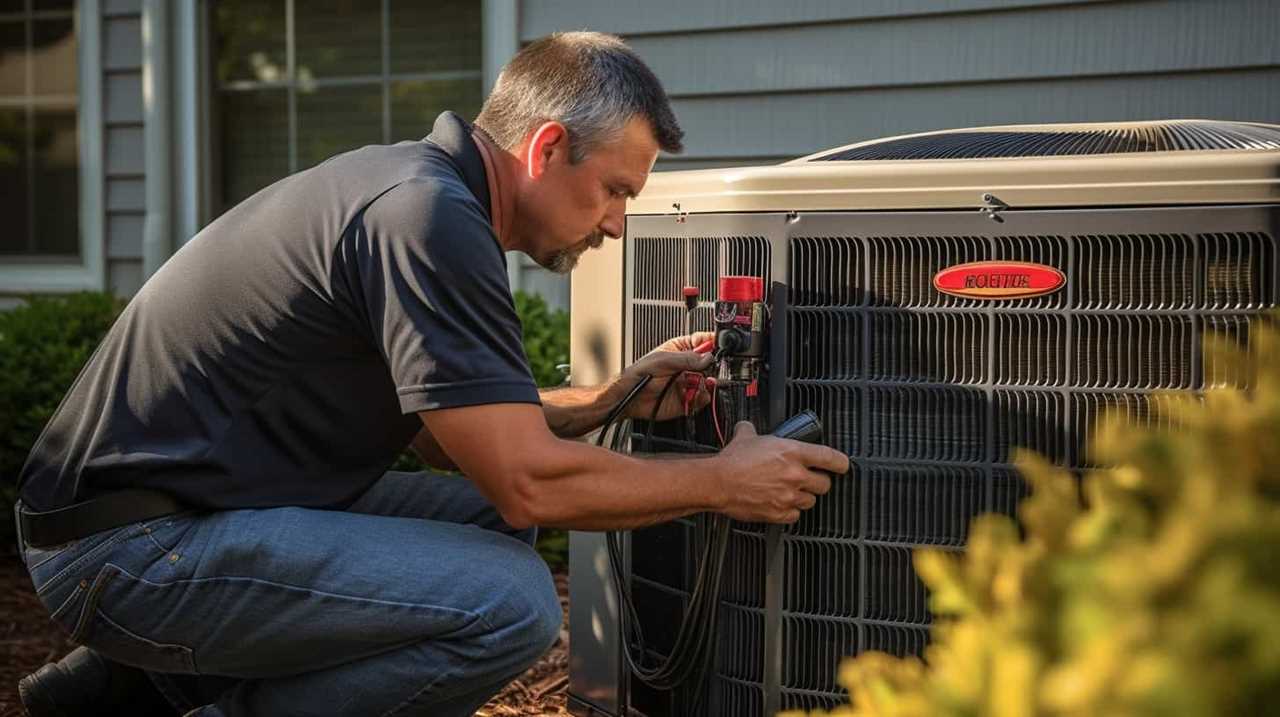
The second technology is two-stage compressors, which have two levels of compression to provide the required heating or cooling capacity. This allows for better matching of the compressor capacity to the load, resulting in improved efficiency.
The third technology is scroll compressors, which offer higher efficiency compared to traditional reciprocating compressors. They operate smoothly and quietly, reducing energy losses and improving overall performance.
These advanced compressor technologies, when combined with enhanced heat exchanger design, can further enhance the efficiency of heat pumps. By optimizing heat transfer and reducing pressure drops, heat exchangers play a crucial role in maximizing the performance of the heat pump system.
Enhanced Heat Exchanger Design
To maximize heat pump efficiency, we can enhance the heat exchanger design by optimizing heat transfer and minimizing pressure drops. By improving the efficiency of heat exchangers, we can ensure that the heat pump operates more effectively, resulting in lower energy consumption and reduced costs.

One way to achieve enhanced heat exchanger efficiency is through the use of advanced heat transfer methods. These methods include the use of enhanced surfaces, such as microchannels or fins, which increase the surface area available for heat transfer. Additionally, techniques like turbulence promotion and flow optimization can further enhance heat transfer rates. By incorporating these advanced heat transfer methods into heat exchanger design, we can significantly improve the overall efficiency of heat pumps.
This enhanced efficiency translates into greater comfort, energy savings, and environmental sustainability.
Transitioning into the subsequent section about ‘intelligent defrost control’, optimizing the heat exchanger design is just one step towards maximizing heat pump performance.
Intelligent Defrost Control
One key technique to improve heat pump efficiency is implementing intelligent defrost control.

Intelligent defrost control is a method that optimizes the defrosting process in heat pumps to ensure efficient operation while minimizing energy consumption.
This technique is particularly useful in geothermal heat pump applications, where the system extracts heat from the ground.
During colder weather, frost can accumulate on the heat exchanger coil, reducing its ability to transfer heat.
Intelligent defrost control monitors various parameters, such as outdoor temperature and coil temperature, to determine when a defrost cycle is necessary.

By analyzing these factors, the system can defrost only when needed, preventing unnecessary energy consumption.
Additionally, intelligent defrost control can adjust the duration and frequency of defrost cycles based on real-time conditions, further maximizing efficiency.
Variable Speed Drive Systems
Variable speed drive systems enhance heat pump efficiency by allowing the motor to adjust its speed based on the heating or cooling demands of the space. This technology, known as variable speed drive technology, offers precise and efficient control over the heat pump’s motor.
By varying the motor speed, the system can match the energy output to the required load, resulting in significant energy savings. Energy efficient motor control is achieved through advanced algorithms and sensors that monitor the ambient temperature and adjust the motor speed accordingly. This ensures that the heat pump operates at its optimum capacity, maximizing efficiency and reducing energy consumption.
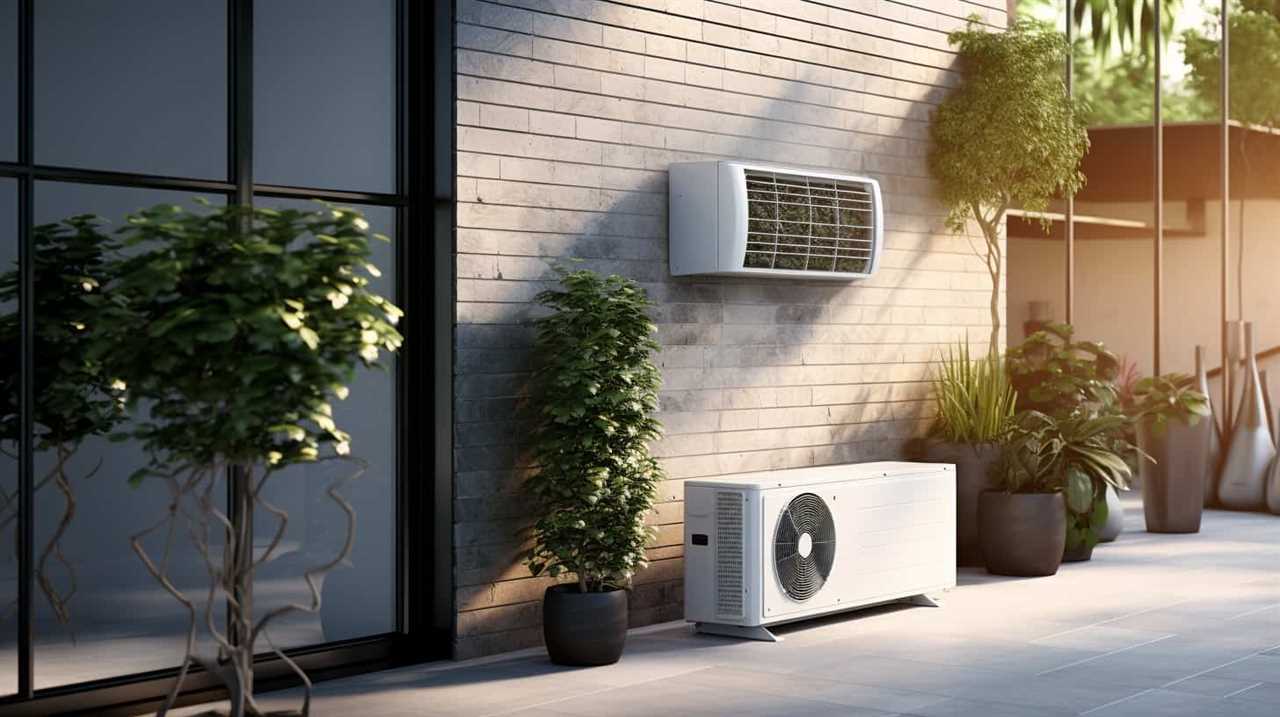
Additionally, variable speed drive systems offer quieter operation and longer equipment lifespan due to reduced wear and tear on the motor.
Thermal Energy Storage Integration
We can improve heat pump efficiency by integrating thermal energy storage through effective management and utilization of stored heat energy.
By incorporating thermal energy storage into heat pump systems, we can achieve several benefits:
-
Increased energy storage efficiency: Thermal energy storage allows us to store excess heat energy during off-peak hours when electricity rates are lower. This stored energy can then be used during peak hours when electricity rates are higher, reducing overall energy costs.

-
Enhanced system flexibility: Integrating thermal energy storage provides greater flexibility in heat pump operation. By storing excess heat energy, we can meet varying heating demands more efficiently, ensuring a constant supply of hot water or space heating without relying solely on the heat pump’s operation.
-
Reduced environmental impact: By utilizing thermal energy storage, we can optimize the heat pump’s operation and reduce the need for auxiliary heating sources. This leads to lower greenhouse gas emissions and a more sustainable heating solution.
Geothermal Heat Pump Applications
Geothermal heat pump applications offer cost-effective energy solutions, environmental benefits, and increased home comfort.
By harnessing the natural heat stored in the earth, these systems can significantly reduce heating and cooling costs.

Additionally, geothermal heat pumps have a smaller carbon footprint compared to traditional heating and cooling systems, making them a more environmentally friendly choice.
Moreover, the consistent temperature provided by geothermal heat pumps ensures optimal comfort inside the home, regardless of the weather conditions outside.
Cost-Effective Energy Solutions
Let’s explore how we can maximize energy efficiency by implementing cost-effective solutions for geothermal heat pump applications.
When it comes to cost-effective installation methods for geothermal heat pumps, there are several options to consider. These include:

-
Vertical Closed-Loop Systems: This method involves drilling deep boreholes to access the Earth’s heat. It’s a highly efficient and reliable option, especially in areas with limited space.
-
Horizontal Closed-Loop Systems: This installation method utilizes horizontal trenches to circulate the heat exchange fluid. It’s a more affordable alternative to vertical systems, making it suitable for larger properties with ample land.
-
Hybrid Systems: Combining geothermal heat pumps with other renewable energy sources, such as solar or wind power, can further enhance energy efficiency. These systems allow for the integration of multiple sustainable energy solutions, reducing reliance on traditional fossil fuels.
Environmental Benefits of Geothermal
By harnessing the Earth’s natural heat and utilizing it for heating and cooling purposes, we can reduce our reliance on non-renewable energy sources and contribute to a cleaner and more sustainable environment. Geothermal technology offers a renewable energy solution that taps into the Earth’s heat to provide efficient heating and cooling systems for residential and commercial buildings. Unlike traditional heating and cooling methods, geothermal heat pump applications produce minimal greenhouse gas emissions and have a significantly lower carbon footprint. The table below highlights some of the key environmental benefits of geothermal technology compared to other energy sources:

| Environmental Benefits | Geothermal Technology | Non-Renewable Energy Sources |
|---|---|---|
| Reduced greenhouse gas emissions | ✓ | ✗ |
| Lower carbon footprint | ✓ | ✗ |
| Less dependence on fossil fuels | ✓ | ✗ |
| Preservation of natural resources | ✓ | ✗ |
| Contribution to a sustainable future | ✓ | ✗ |
Increased Home Comfort
We can enhance the comfort of our homes through the applications of geothermal heat pumps. Geothermal heat pumps provide increased energy savings and personalized temperature control, resulting in a more comfortable living environment.
Here are three key benefits of geothermal heat pump applications:
-
Improved Energy Efficiency: Geothermal heat pumps tap into the stable temperature of the earth to efficiently heat or cool our homes. This reduces the reliance on traditional energy sources and lowers energy costs, leading to increased energy savings.
-
Consistent and Personalized Temperature Control: Geothermal heat pumps provide precise control over indoor temperatures, allowing homeowners to set their preferred levels of comfort. The system can adjust to the specific needs of each room, ensuring a consistent and comfortable environment throughout the house.
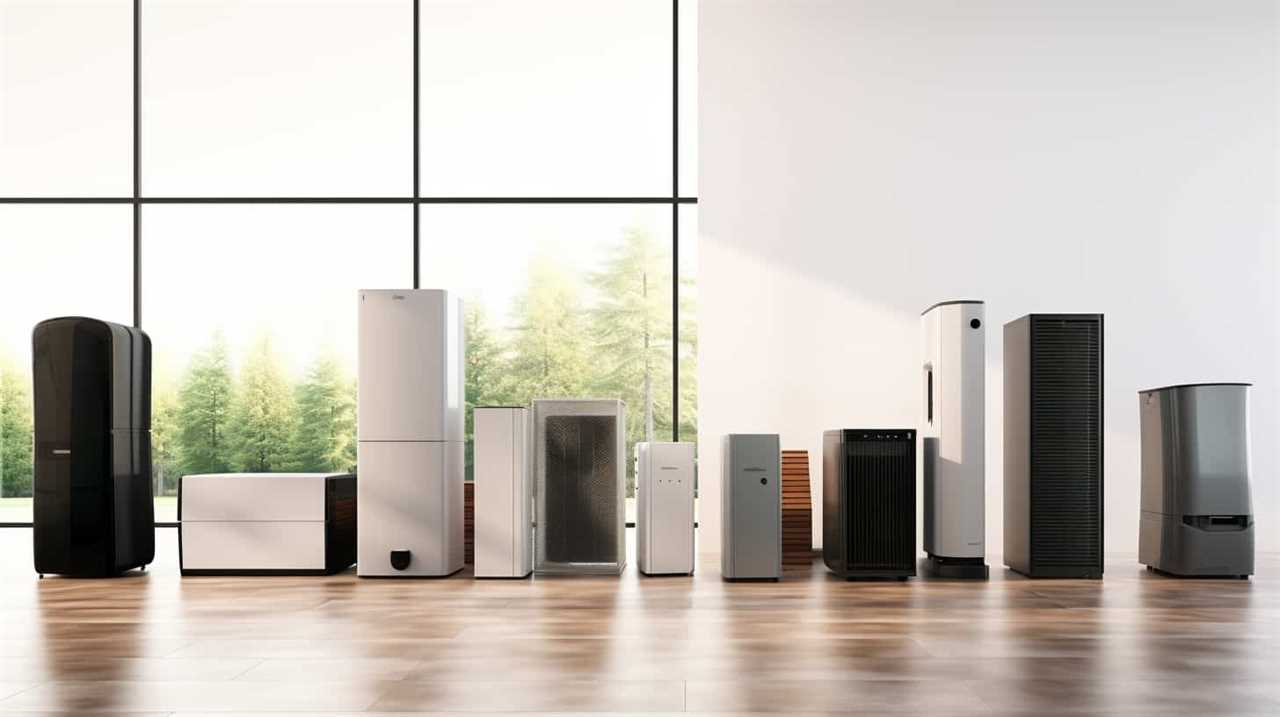
-
Reduced Noise and Improved Air Quality: Geothermal heat pumps operate quietly, eliminating the noise associated with traditional heating and cooling systems. Additionally, they don’t rely on fossil fuels, resulting in cleaner and healthier indoor air quality.
Smart Thermostat Optimization
Smart thermostat optimization is an essential aspect of boosting heat pump efficiency.
By implementing energy-saving temperature schedules, homeowners can ensure that their heat pump operates at optimal levels and uses energy efficiently.
Additionally, the remote control capabilities of smart thermostats enable users to adjust settings from anywhere, allowing for better management of energy consumption and ultimately increasing the overall efficiency of the heat pump system.

Energy-Saving Temperature Schedules
Our goal is to optimize temperature schedules in order to save energy and improve heat pump efficiency. By implementing energy-saving temperature schedules, we can achieve cost-effective temperature control and enhance the performance of our HVAC systems.
Here are three key benefits of utilizing such schedules:
-
Reduced energy consumption: By programming temperature adjustments based on occupancy patterns and outdoor weather conditions, energy wastage can be minimized. This leads to lower utility bills and a reduced carbon footprint.
-
Improved comfort: Energy-saving temperature schedules ensure that your home or building is consistently maintained at a comfortable temperature, resulting in increased occupant satisfaction.

-
Extended equipment lifespan: By reducing the workload on your heat pump, energy-efficient temperature schedules can help prolong its lifespan and reduce the need for repairs and replacements.
Remote Control Capabilities
By utilizing remote control capabilities and integrating smart thermostat optimization, we can effectively enhance the efficiency of our heat pump systems.
Remote control integration allows us to conveniently control our heat pump settings from anywhere, ensuring that our systems are always operating at optimal levels.
Through energy efficient programming, we can schedule temperature adjustments based on our daily routines and preferences, further maximizing energy savings.

With the ability to remotely monitor and adjust our heat pump systems, we can easily make real-time changes to optimize performance and reduce energy waste.
Additionally, smart thermostat optimization enables us to analyze energy usage patterns and make informed decisions to improve efficiency.
Heat Recovery Systems
We can improve the efficiency of heat pumps by implementing heat recovery systems. Heat recovery systems enable the transfer and reuse of waste heat generated by the heat pump for other purposes, such as water heating or space heating.
Here are three key benefits of heat recovery systems:

-
Energy savings: By utilizing waste heat, heat recovery systems reduce the overall energy consumption of the heat pump. This results in lower energy bills and a more sustainable operation.
-
Increased comfort: Heat recovery systems can provide additional heat to other areas of the building, improving overall comfort levels. This is especially beneficial in larger buildings with multiple zones.
-
Environmental impact: By maximizing the use of waste heat, heat recovery systems reduce the need for additional energy sources, resulting in lower greenhouse gas emissions and a reduced carbon footprint.
Improved Insulation Materials
When it comes to improving heat pump efficiency, one important aspect to consider is the use of improved insulation materials. Thicker insulation layers can significantly reduce heat loss and improve overall energy efficiency.

Additionally, advancements in insulating materials, such as aerogels and vacuum panels, offer even better thermal resistance and insulation properties.
Thicker Insulation Layers
The use of thicker insulation layers with improved insulation materials can significantly enhance the efficiency of heat pumps. Thicker insulation layers provide better thermal resistance, reducing heat transfer between the indoor and outdoor environments. This helps maintain a consistent temperature inside the building, reducing the workload on the heat pump and improving energy efficiency.
Here are three reasons why thicker insulation layers are beneficial:
-
Reduced heat loss: Thicker insulation layers minimize heat loss through walls, ceilings, and floors, ensuring that the heat generated by the heat pump stays inside the building. This results in less energy wastage and lower heating costs.
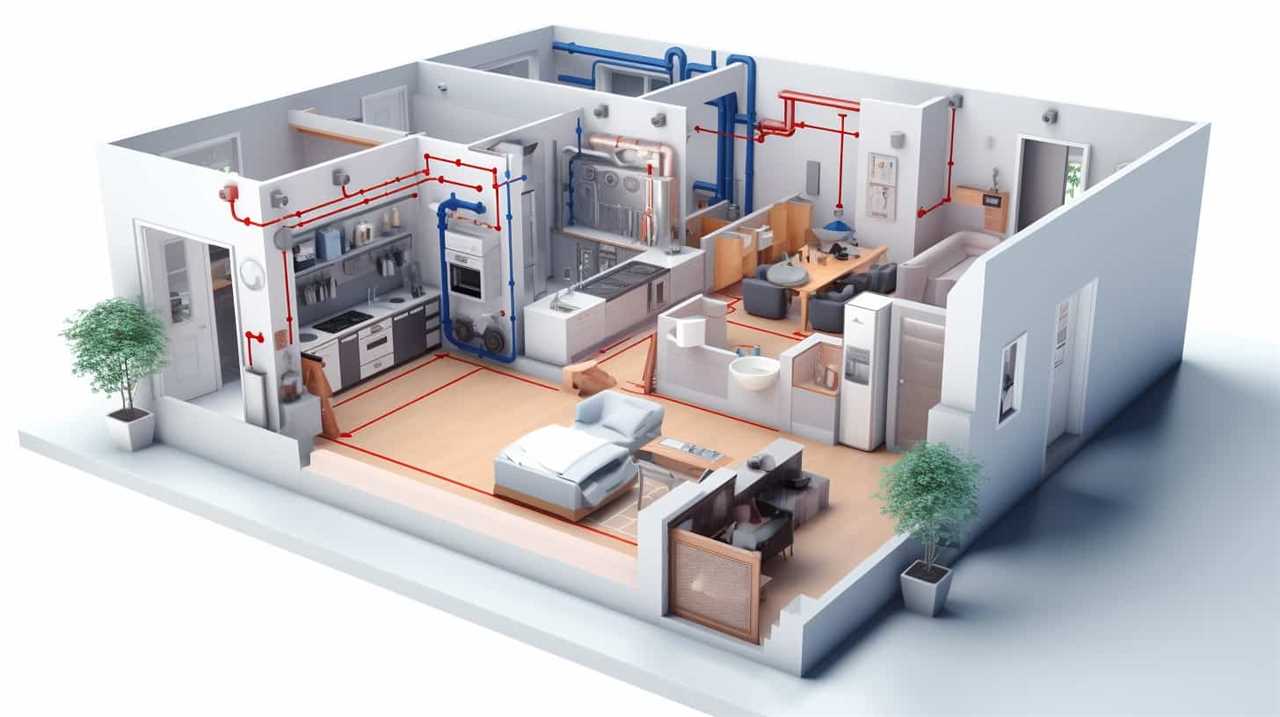
-
Improved comfort: Thicker insulation layers create a barrier against cold drafts and external temperature fluctuations. This enhances indoor comfort by maintaining a stable and comfortable temperature throughout the year.
-
Environmental impact: Thicker insulation layers can reduce the carbon footprint of a building by lowering energy consumption. By improving heat pump efficiency, less energy is required to achieve the desired indoor temperature, resulting in fewer greenhouse gas emissions.
Advanced Insulating Materials
Using advanced insulating materials can improve heat pump efficiency. These materials, such as aerogels and vacuum insulation panels (VIPs), employ advanced insulation technologies and thermal conductivity reduction techniques to enhance the performance of heat pumps.
To illustrate the benefits of advanced insulating materials, consider the following table:
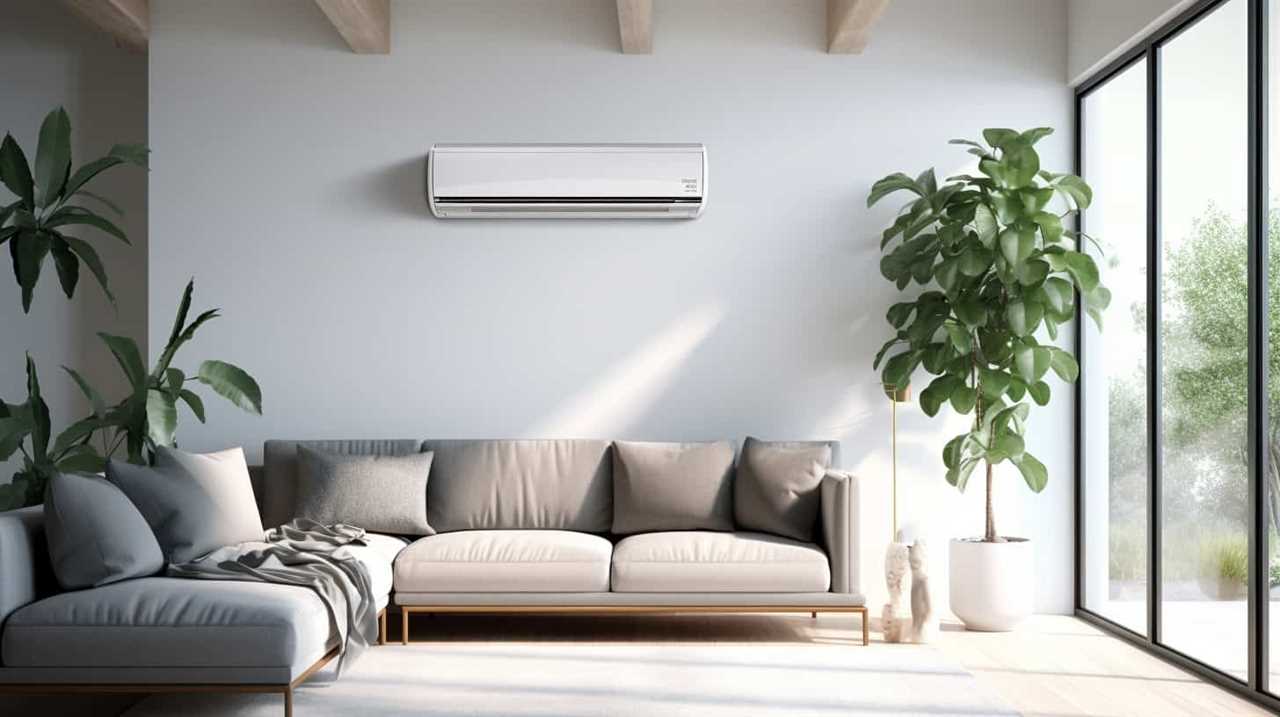
| Insulation Material | Thermal Conductivity (W/mK) | Thickness (mm) | R-value (m²K/W) |
|---|---|---|---|
| Standard Fiberglass | 0.040 | 100 | 2.5 |
| Aerogel | 0.013 | 20 | 7.7 |
| VIP | 0.004 | 10 | 25 |
| Advanced Foam | 0.020 | 50 | 5.0 |
As shown in the table, advanced insulating materials have significantly lower thermal conductivity compared to standard fiberglass insulation. This lower thermal conductivity leads to thinner insulation layers, resulting in improved heat pump efficiency. By incorporating these advanced insulation technologies, heat pumps can achieve higher energy efficiency ratings and reduce energy consumption, benefiting both the environment and the users.
Insulation for Optimal Performance
For optimal performance, we can enhance heat pump efficiency by using improved insulation materials. Insulation plays a crucial role in reducing heat transfer and ensuring that the heat pump operates at its maximum efficiency.
Here are three types of insulation materials and installation techniques that can significantly improve the performance of heat pumps:
-
Spray Foam Insulation: This type of insulation is applied as a liquid and expands to fill gaps and crevices, providing an airtight seal. It offers excellent thermal resistance and minimizes heat loss, resulting in improved energy efficiency.

-
Reflective Insulation: This type of insulation consists of a reflective surface that reflects radiant heat away from the heat pump. By reducing heat absorption, it helps maintain a consistent temperature and enhances overall efficiency.
-
Insulation Installation Techniques: Proper installation techniques, such as sealing all joints and gaps, using vapor barriers, and ensuring adequate insulation thickness, are essential for optimal performance. These techniques prevent air leakage, moisture buildup, and thermal bridging, resulting in improved heat pump efficiency.
Optimal Refrigerant Selection
We should consider the environmental impact when selecting the most suitable refrigerant for optimal heat pump efficiency. Refrigerant efficiency plays a crucial role in determining the overall performance of a heat pump system. By choosing the right refrigerant, we can minimize energy consumption and reduce greenhouse gas emissions.
To achieve this, refrigerant selection optimization is necessary. It involves evaluating various factors such as thermodynamic properties, environmental impact, and safety considerations. For instance, selecting a refrigerant with a low global warming potential (GWP) can significantly contribute to reducing carbon emissions. Additionally, the refrigerant’s heat transfer properties and compatibility with the heat pump system should be carefully analyzed.

By optimizing refrigerant selection, we can enhance heat pump efficiency while ensuring minimal environmental impact.
This leads us to the next section, where we’ll discuss the importance of energy monitoring and management.
Energy Monitoring and Management
Our team utilizes advanced energy monitoring and management techniques to maximize heat pump efficiency and optimize energy consumption. By conducting thorough energy consumption analysis, we’re able to identify areas of improvement and implement strategies to reduce energy waste. Our load balancing strategies ensure that the heat pump operates at its optimal capacity, avoiding unnecessary energy consumption.
-
Real-time monitoring: We employ cutting-edge technology to continuously monitor the energy consumption of the heat pump. This allows us to identify any anomalies or inefficiencies promptly and take appropriate action.

-
Data-driven decision-making: Our energy monitoring system generates detailed reports and data analysis, enabling us to make informed decisions about energy usage. This allows us to optimize the heat pump’s performance and minimize energy waste.
-
Smart energy management: With our advanced energy management techniques, we can automate and optimize the heat pump’s operation based on factors such as weather conditions and occupancy patterns. This ensures that energy is used efficiently, avoiding unnecessary consumption and reducing costs.
Frequently Asked Questions
How Does Advanced Compressor Technology Contribute to Boosting Heat Pump Efficiency?
Advanced compressor technology significantly boosts heat pump efficiency. By incorporating innovative strategies and advancements, we improve the overall performance and energy efficiency of heat pumps, leading to reduced energy consumption and cost savings for consumers.
What Are Some Key Features of Enhanced Heat Exchanger Design That Enhance Heat Pump Efficiency?
Enhanced heat exchanger design incorporates features such as heat transfer enhancement and refrigerant flow optimization. These techniques improve heat pump efficiency by increasing the rate of heat transfer and optimizing the flow of refrigerant, resulting in enhanced performance.

How Does Intelligent Defrost Control Improve the Efficiency of Heat Pumps?
Intelligent defrost control techniques play a crucial role in optimizing heat pump efficiency. By accurately sensing frost buildup and strategically timing defrost cycles, we can prevent energy waste and ensure optimal performance.
Can You Explain the Benefits of Using Variable Speed Drive Systems in Heat Pump Applications?
Variable speed drive systems in heat pump applications offer significant benefits. By adjusting the speed of the compressor and fan motors to match the load, these systems provide precise control, resulting in improved energy efficiency and substantial energy savings.
How Does Thermal Energy Storage Integration Help to Optimize the Efficiency of Heat Pumps?
Thermal energy storage integration optimizes heat pump efficiency by allowing excess energy to be stored for later use. Smart grid connectivity enables the heat pump to communicate with the grid, ensuring energy is used efficiently.
Conclusion
In conclusion, by implementing these 11 innovative techniques, heat pump efficiency can be significantly boosted.

Advanced compressor technology, enhanced heat exchanger design, and intelligent defrost control are just a few examples of the advancements that can revolutionize the performance of heat pump systems.
With variable speed drive systems, thermal energy storage integration, and improved insulation materials, the potential for energy savings becomes even greater.
By selecting optimal refrigerants and implementing energy monitoring and management systems, the future of heat pump efficiency looks promising.
Stay tuned for more exciting advancements in this field!


Thermal Energy Transfer
Boost Heat Pump Efficiency: Renewable Energy’s Unexpected Power

Are you prepared to unleash the complete capabilities of your heat pump? Search no more! In this article, we will delve into the surprising impact of renewable energy on enhancing heat pump effectiveness.
Get ready to revolutionize your heating system as we delve into the role of solar energy, harnessing geothermal power, the game-changing wind energy, sustainable biomass solutions, and the untapped potential of hydropower.
Prepare to master the art of maximizing heat pump performance with the help of renewable energy sources.
Key Takeaways
- Solar panel integration allows for the direct conversion of sunlight into electricity, reducing reliance on traditional power sources.
- Geothermal energy can maximize heat pump performance by providing heat stored beneath the Earth’s surface, leading to higher levels of efficiency.
- Wind power can revolutionize heat pump efficiency by generating electricity to power heat pumps, reducing their carbon footprint.
- Biomass combined with heat pump technology greatly enhances efficiency and sustainability, reducing reliance on fossil fuels and emitting fewer greenhouse gases.
The Role of Solar Energy in Enhancing Heat Pump Efficiency
We can enhance heat pump efficiency by utilizing solar energy. Solar panel integration plays a crucial role in harnessing renewable energy for heat pumps. By connecting solar panels to heat pump systems, we can directly convert sunlight into electricity, reducing reliance on traditional power sources. This integration allows heat pumps to operate more efficiently, as they can draw power from the solar panels during daylight hours.
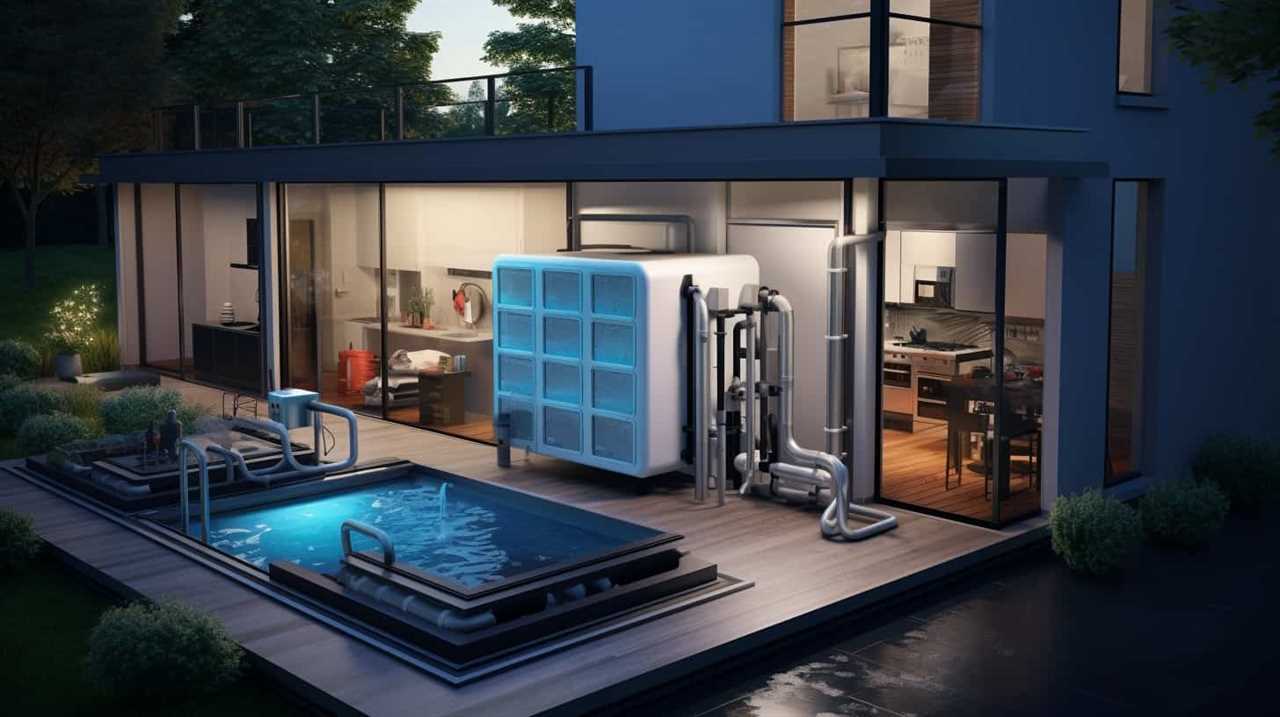
Additionally, energy storage solutions can further optimize heat pump performance. Storing excess solar energy in batteries or other storage systems ensures a continuous power supply for heat pumps, even when sunlight is limited.
This combination of solar panel integration and energy storage solutions maximizes the utilization of renewable energy, significantly improving heat pump efficiency.
Harnessing Geothermal Power to Maximize Heat Pump Performance
One way to maximize heat pump performance is by harnessing the power of geothermal energy. Geothermal energy is heat that is stored beneath the Earth’s surface in geothermal reservoirs. This heat can be extracted and used to provide heating and cooling for buildings. Geothermal innovations have made it possible to tap into this renewable energy source and optimize the efficiency of heat pumps.
By utilizing geothermal energy, heat pumps can achieve higher levels of efficiency compared to traditional heating and cooling systems. The table below illustrates the advantages of harnessing geothermal power for heat pump performance:
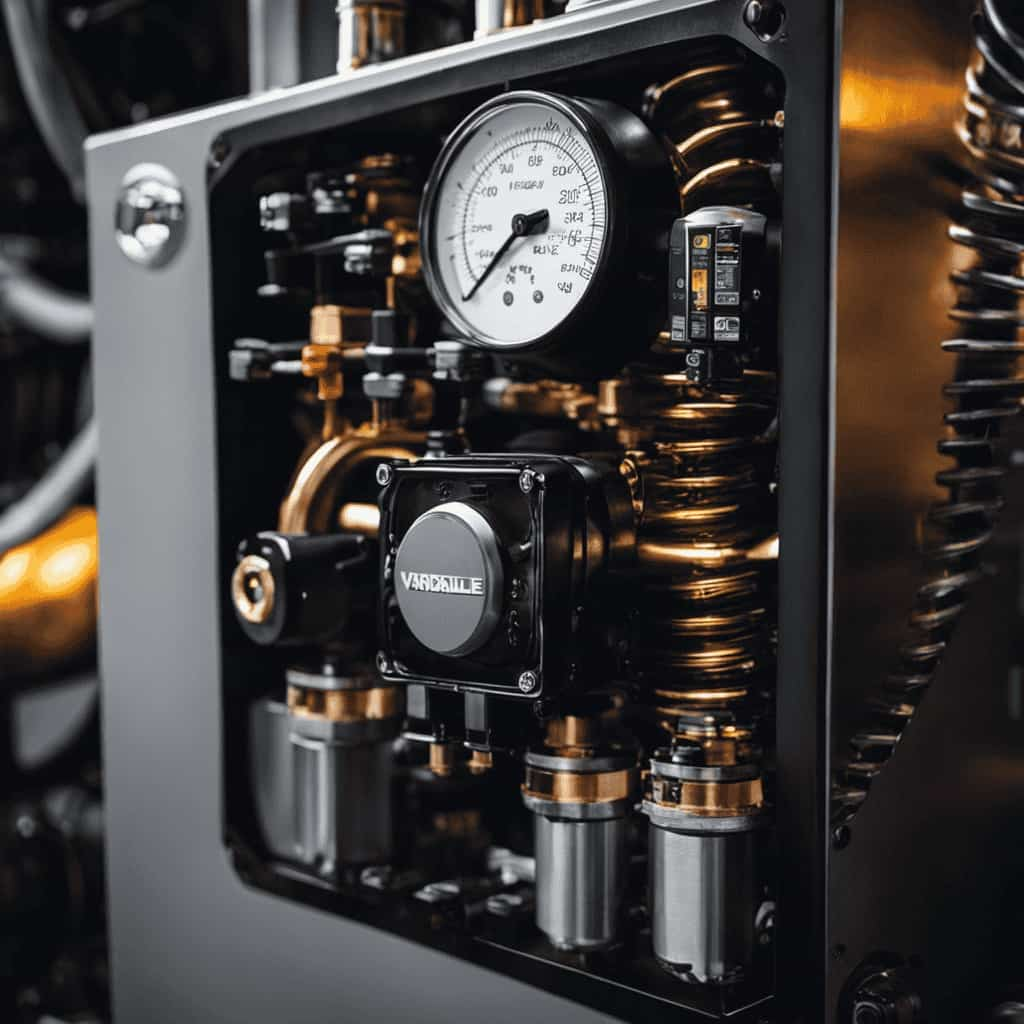
| Advantages of Geothermal Power for Heat Pump Performance |
|---|
| Higher efficiency |
| Reduced energy consumption |
| Lower operating costs |
| Environmentally friendly |
Harnessing geothermal power not only improves the performance of heat pumps but also contributes to a more sustainable and energy-efficient future. By utilizing the abundant geothermal resources available, we can maximize the efficiency of heat pumps and reduce our carbon footprint.
Wind Energy: A Game-Changer for Heat Pump Efficiency
Harnessing wind energy can revolutionize heat pump efficiency.
Wind energy has the potential to be a game changer for heat pump technology, offering significant benefits to renewable energy solutions.
By utilizing wind power to generate electricity, heat pumps can operate more efficiently and reduce their carbon footprint.

Wind turbines can produce large amounts of electricity, which can be used to power heat pumps, allowing them to operate at higher efficiencies.
Additionally, wind energy is a clean and renewable source, making it an environmentally friendly option for heat pump systems.
The integration of wind energy into heat pump technology enhances the overall performance and sustainability of these systems.
Biomass: A Sustainable Solution for Boosting Heat Pump Efficiency
Using biomass as a renewable fuel source and combining it with heat pump technology can greatly enhance efficiency and sustainability. Biomass, which refers to organic materials such as wood, agricultural residues, and dedicated energy crops, offers a promising alternative fuel for heat pumps. By harnessing the energy stored in biomass, heat pumps can provide a reliable and efficient heating solution while reducing reliance on fossil fuels. The innovative combination of biomass and heat pump technology allows for a more sustainable heating system that emits fewer greenhouse gases and decreases overall energy consumption. To illustrate the potential benefits of this approach, consider the table below, which compares the energy efficiency and carbon emissions of biomass-powered heat pumps to conventional heating systems.
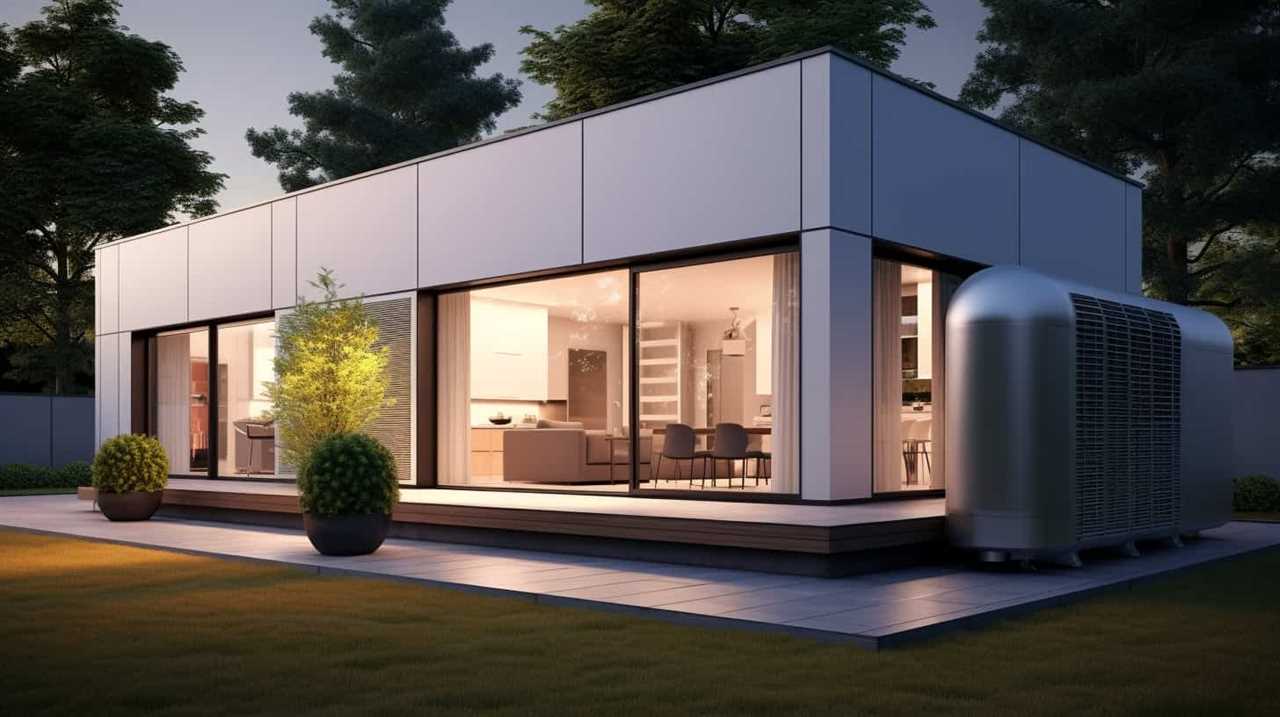
| Heating System | Energy Efficiency (COP) | Carbon Emissions (kgCO2/MWh) |
|---|---|---|
| Biomass Heat Pump | 4.5 | 10 |
| Natural Gas Boiler | 0.9 | 200 |
| Oil Boiler | 0.85 | 250 |
| Electric Resistance | 1 | 500 |
| Air-Source Heat Pump | 3 | 60 |
As shown in the table, biomass heat pumps have a significantly higher energy efficiency and lower carbon emissions compared to other heating systems. This makes them an attractive and sustainable solution for boosting heat pump efficiency.
Hydropower: Unleashing the Potential of Water to Improve Heat Pump Performance
We can maximize heat pump performance by tapping into the immense potential of hydropower, using water as a renewable energy source. Hydropower, also known as hydroelectric power, offers several advantages in improving heat pump efficiency.
- Water Efficiency:
- Hydropower utilizes the natural flow of water, harnessing its kinetic energy to generate electricity.
- This process doesn’t consume water, making it a highly water-efficient energy source.
- Heat pumps can benefit from this water efficiency by leveraging hydropower for their operations, reducing overall water consumption.
- Hydroelectric Power:
- Hydropower plants can generate a significant amount of electricity, providing a reliable and consistent power source for heat pumps.
- The scalability of hydropower allows for large-scale generation, accommodating the increasing demand for heat pump installations.
- By integrating hydropower into heat pump systems, we can enhance their performance and contribute to a more sustainable and efficient energy ecosystem.
Harnessing the power of water through hydropower can significantly improve heat pump performance, ensuring optimal energy utilization and reducing environmental impact.
Frequently Asked Questions
What Are the Key Factors to Consider When Choosing a Heat Pump for Optimal Efficiency?
When choosing a heat pump for optimal efficiency, key factors to consider include heat pump installation and heat pump sizing. These factors play a crucial role in maximizing energy efficiency and ensuring optimal performance.
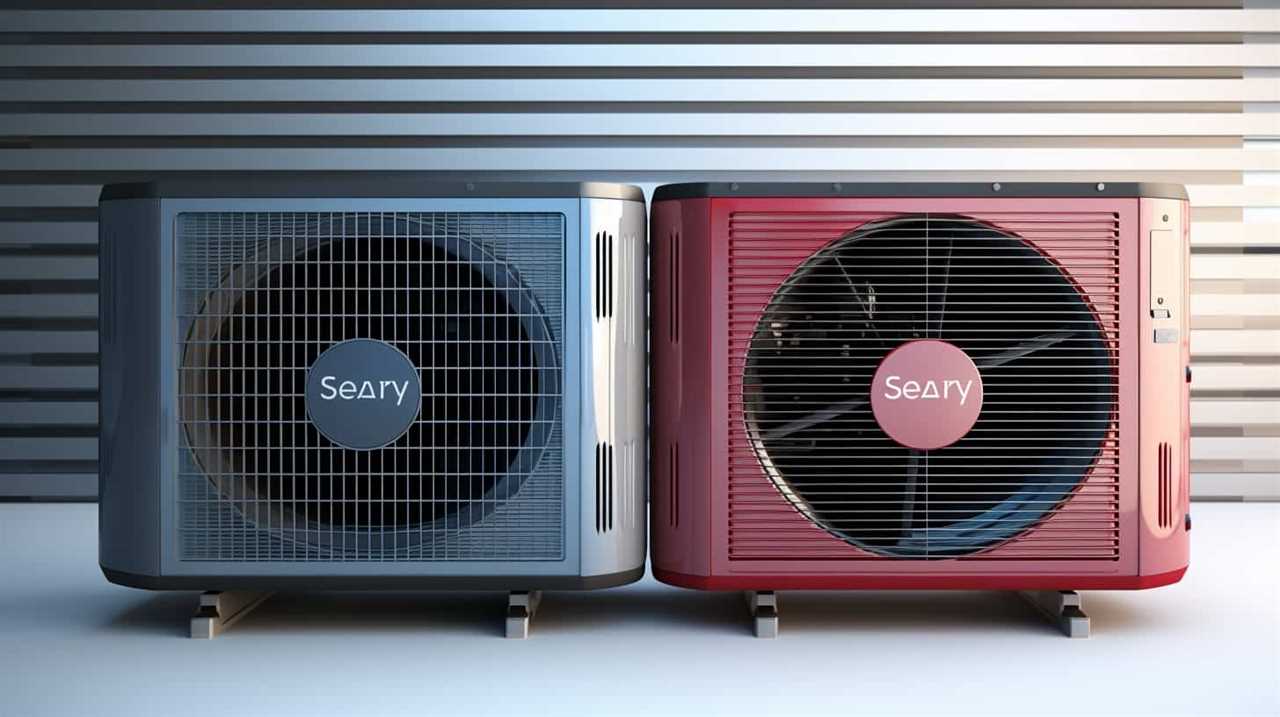
Can Heat Pumps Be Used in All Types of Climates or Are They More Suitable for Specific Regions?
Heat pumps can be used in all types of climates, but their efficiency may vary in extreme conditions. Some limitations include reduced performance in very cold regions and the need for additional heating sources.
Are There Any Government Incentives or Tax Credits Available for Installing Heat Pumps?
There are government incentives and tax credits available for installing heat pumps. These incentives can significantly reduce the upfront cost and make renewable energy more accessible to homeowners and businesses.
How Long Does It Typically Take for a Heat Pump to Pay for Itself in Terms of Energy Savings?
The heat pump payback period depends on various factors, including energy costs, climate, and insulation. It typically takes about 5-10 years for a heat pump to pay for itself in terms of energy savings.
Are There Any Maintenance Requirements or Recommended Practices to Ensure the Long-Term Efficiency of a Heat Pump?
To ensure long-term efficiency, heat pumps require regular maintenance and adherence to recommended practices. These include cleaning or replacing air filters, checking refrigerant levels, and inspecting electrical components. Neglecting these requirements can result in decreased performance and higher energy consumption.

Conclusion
In conclusion, renewable energy sources such as solar, geothermal, wind, biomass, and hydropower play a crucial role in boosting heat pump efficiency.
One interesting statistic to note is that harnessing solar energy can increase heat pump performance by up to 40%, while utilizing geothermal power can improve efficiency by up to 50%.
These renewable energy solutions not only provide sustainable alternatives to traditional heating methods but also contribute to a more energy-efficient and environmentally friendly future.
Thermal Energy Transfer
Decoding Heat Pumps’ Energy Efficiency Ratings: A Guide

Welcome to our guide on understanding the energy efficiency ratings of heat pumps! Have you ever been confused by the numbers and acronyms? We’re here to assist you.
In this article, we’ll break down the importance of energy efficiency ratings, how they’re calculated, and the key metrics to look out for.
We’ll also provide tips on maximizing your heat pump’s performance.
So, let’s dive in and uncover the secrets to choosing the most efficient heat pump for your needs.
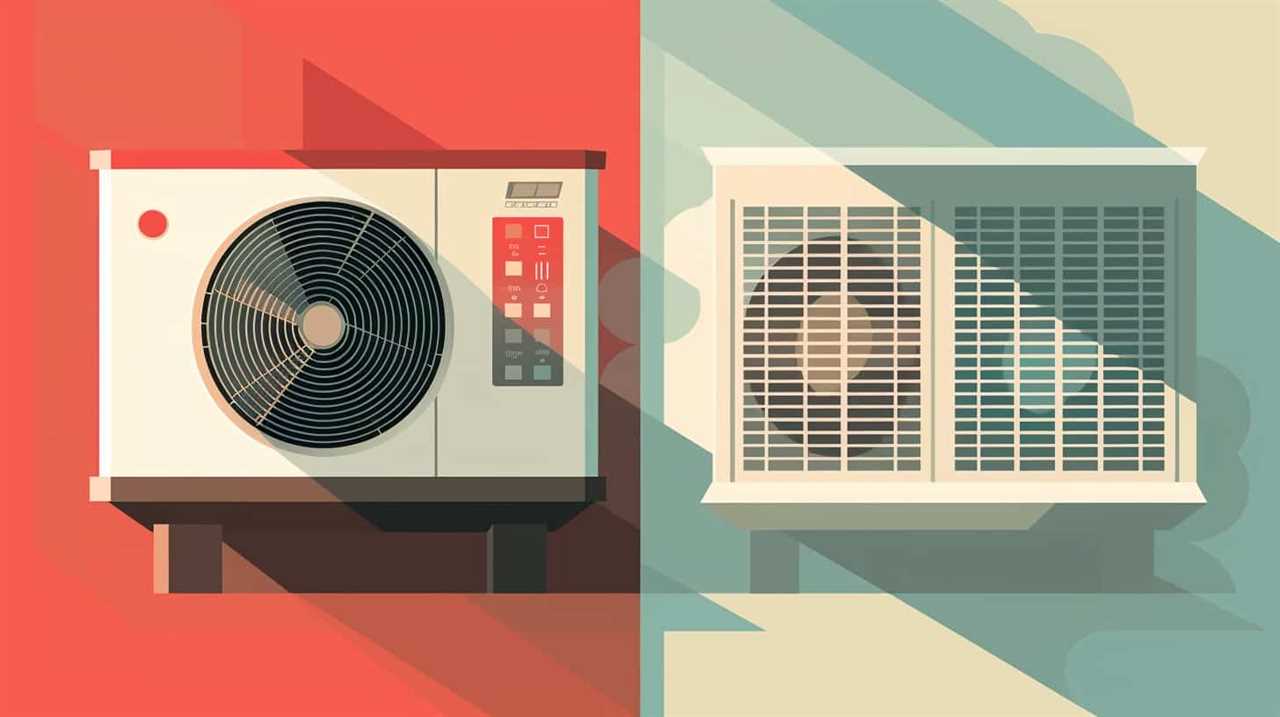
Key Takeaways
- Energy efficiency ratings are important in determining the effectiveness and cost savings of heat pumps.
- Higher efficiency ratings indicate lower energy consumption and can lead to reduced energy bills.
- Heat pumps with higher efficiency ratings often qualify for rebates and incentives.
- Evaluating energy efficiency ratings helps in making informed decisions and maximizing the benefits of heat pumps.
The Importance of Energy Efficiency Ratings in Heat Pumps
We believe that energy efficiency ratings play a crucial role in determining the effectiveness of heat pumps. When evaluating energy savings and long-term cost benefits, it’s important to consider the efficiency rating of a heat pump.
An energy efficiency rating provides a measure of how effectively a heat pump converts electricity into heat. Higher efficiency ratings indicate that the heat pump is more efficient in converting energy, resulting in lower energy consumption and ultimately, cost savings.
By choosing a heat pump with a high energy efficiency rating, homeowners can reduce their energy bills and minimize their environmental impact. Additionally, heat pumps with higher efficiency ratings often qualify for rebates and incentives, further enhancing the long-term cost benefits.
Evaluating energy efficiency ratings is therefore essential in making informed decisions and maximizing the benefits of heat pump technology.

How Energy Efficiency Ratings Are Calculated for Heat Pumps
To determine the energy efficiency rating of a heat pump, manufacturers use standardized testing procedures to measure its performance and calculate the ratio of heat output to electricity input. This calculation process takes into account various factors that affect the efficiency of the heat pump.
Here are some of the factors considered:
- Seasonal Energy Efficiency Ratio (SEER): This measures the cooling efficiency of the heat pump during the cooling season.
- Heating Seasonal Performance Factor (HSPF): This measures the heating efficiency of the heat pump during the heating season.
- Coefficient of Performance (COP): This measures the overall efficiency of the heat pump by considering both the cooling and heating modes.
Understanding SEER and HSPF: Key Energy Efficiency Metrics for Heat Pumps
SEER and HSPF are important energy efficiency metrics that help consumers understand the performance of heat pumps.
When it comes to evaluating the energy efficiency of heat pumps, it’s essential to understand the differences between SEER and HSPF ratings.

SEER, or Seasonal Energy Efficiency Ratio, measures the cooling efficiency of the heat pump. It calculates the amount of cooling output divided by the energy input over a cooling season. The higher the SEER rating, the more energy-efficient the heat pump is in cooling mode.
On the other hand, HSPF, or Heating Seasonal Performance Factor, measures the heating efficiency of the heat pump. It calculates the amount of heating output divided by the energy input over a heating season. A higher HSPF rating indicates better heating efficiency.
Both SEER and HSPF ratings are important when evaluating the energy efficiency of heat pumps. The choice between the two depends on the climate and the specific heating and cooling needs of the consumer. In warmer climates, where cooling demands are higher, SEER rating becomes more important. In colder climates, where heating demands are higher, HSPF rating is more significant.
To make an informed decision, it’s crucial to consider both SEER and HSPF ratings in order to choose a heat pump that meets your specific energy efficiency needs.

Comparing Energy Efficiency Ratings: What to Look for in Heat Pump Models
When comparing energy efficiency ratings, it’s important to regularly and carefully examine the different features of heat pump models. Here are three key aspects to consider when evaluating energy efficiency in heat pump models:
-
Seasonal Energy Efficiency Ratio (SEER): This rating measures the cooling efficiency of the heat pump. Look for a higher SEER rating, as it indicates better energy efficiency and lower operating costs during the cooling season.
-
Heating Seasonal Performance Factor (HSPF): HSPF measures the heating efficiency of the heat pump. A higher HSPF rating means better energy efficiency and lower heating costs during the heating season.
-
Energy Star Certification: Look for heat pump models that have earned the Energy Star certification. These models meet strict energy efficiency guidelines set by the Environmental Protection Agency (EPA) and can help you save on energy usage and costs.
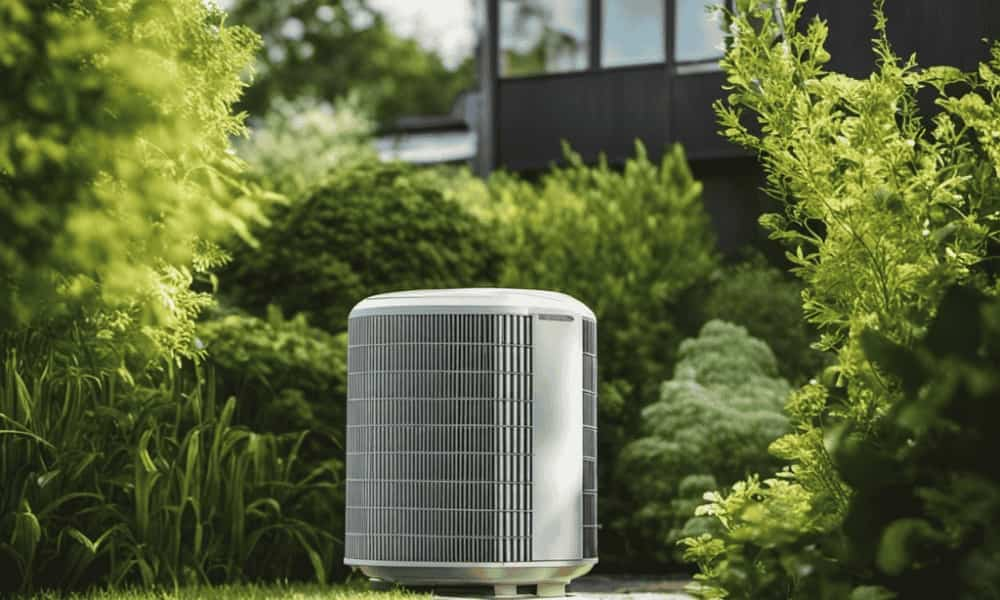
By considering these factors, you can make an informed decision when selecting a heat pump model that prioritizes energy efficiency.
In the next section, we’ll explore tips for maximizing energy efficiency and improving heat pump performance.
Maximizing Energy Efficiency: Tips for Improving Heat Pump Performance
To ensure that we get the most out of our heat pump and maximize its energy efficiency, we should implement these tips for improving its performance. First, regular maintenance is crucial for optimal operation. This includes cleaning or replacing air filters, inspecting and cleaning coils, and checking refrigerant levels. By keeping our heat pump in top condition, we can ensure that it operates efficiently and effectively. Additionally, optimizing the settings on our heat pump can make a significant difference in energy efficiency. Adjusting the thermostat to an appropriate temperature and utilizing programmable settings can help reduce energy consumption. It is also important to consider the size and placement of our heat pump, as these factors can impact its efficiency. By following these tips, we can improve the performance of our heat pump and save on energy costs.
| Tips for Improving Heat Pump Performance |
|---|
| Regular maintenance such as cleaning or replacing air filters, inspecting and cleaning coils, and checking refrigerant levels. |
| Optimizing settings on the heat pump, adjusting the thermostat to an appropriate temperature, and utilizing programmable settings. |
| Considering the size and placement of the heat pump to ensure maximum efficiency. |
Frequently Asked Questions
Are All Heat Pumps Required to Have an Energy Efficiency Rating?
Yes, all heat pumps are required to have an energy efficiency rating. Government regulations and industry standards mandate the inclusion of this rating to provide consumers with information about the product’s energy efficiency performance.
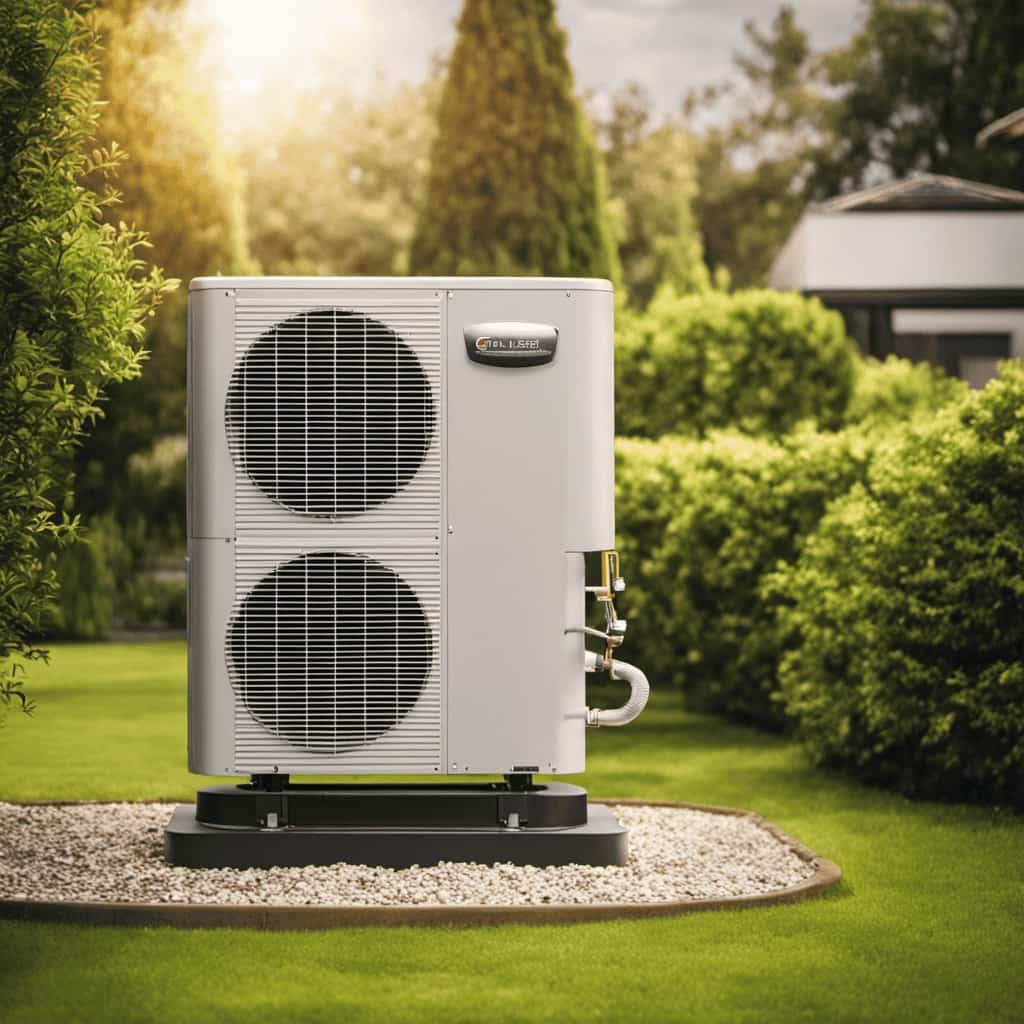
Can the Energy Efficiency Rating of a Heat Pump Change Over Time?
Yes, the energy efficiency rating of a heat pump can change over time due to various factors affecting efficiency. These factors include regular maintenance, age of the equipment, and advancements in technology.
How Can I Determine the Energy Efficiency Rating of My Existing Heat Pump?
To determine the energy efficiency rating of our existing heat pump, we can calculate the efficiency ratio by dividing the output heating or cooling energy by the input electrical energy.
Are There Any Government Incentives or Rebates Available for Purchasing a High-Efficiency Heat Pump?
Yes, there are government incentives and heat pump rebates available for purchasing a high-efficiency heat pump. These incentives and rebates can help reduce the cost and make it more affordable for homeowners to upgrade their heating systems.
Does the Location or Climate Affect the Energy Efficiency Rating of a Heat Pump?
In certain climates, heat pump efficiency ratings can be affected by the location. Additionally, proper installation is crucial for maximizing efficiency. These factors highlight the importance of considering climate and installation when evaluating a heat pump’s energy efficiency.

Conclusion
In conclusion, understanding energy efficiency ratings is crucial when evaluating heat pump options. By decoding SEER and HSPF metrics, consumers can make informed decisions that align with their energy-saving goals.
Comparing ratings and considering tips for maximizing efficiency ensures optimal performance.
Just as a skilled conductor coordinates an orchestra to create a harmonious symphony, homeowners who choose a heat pump with high energy efficiency ratings can enjoy a synchronized blend of comfort and cost savings.
Thermal Energy Transfer
Sustainable Home Design: Heat Pump Systems Efficiency Revealed
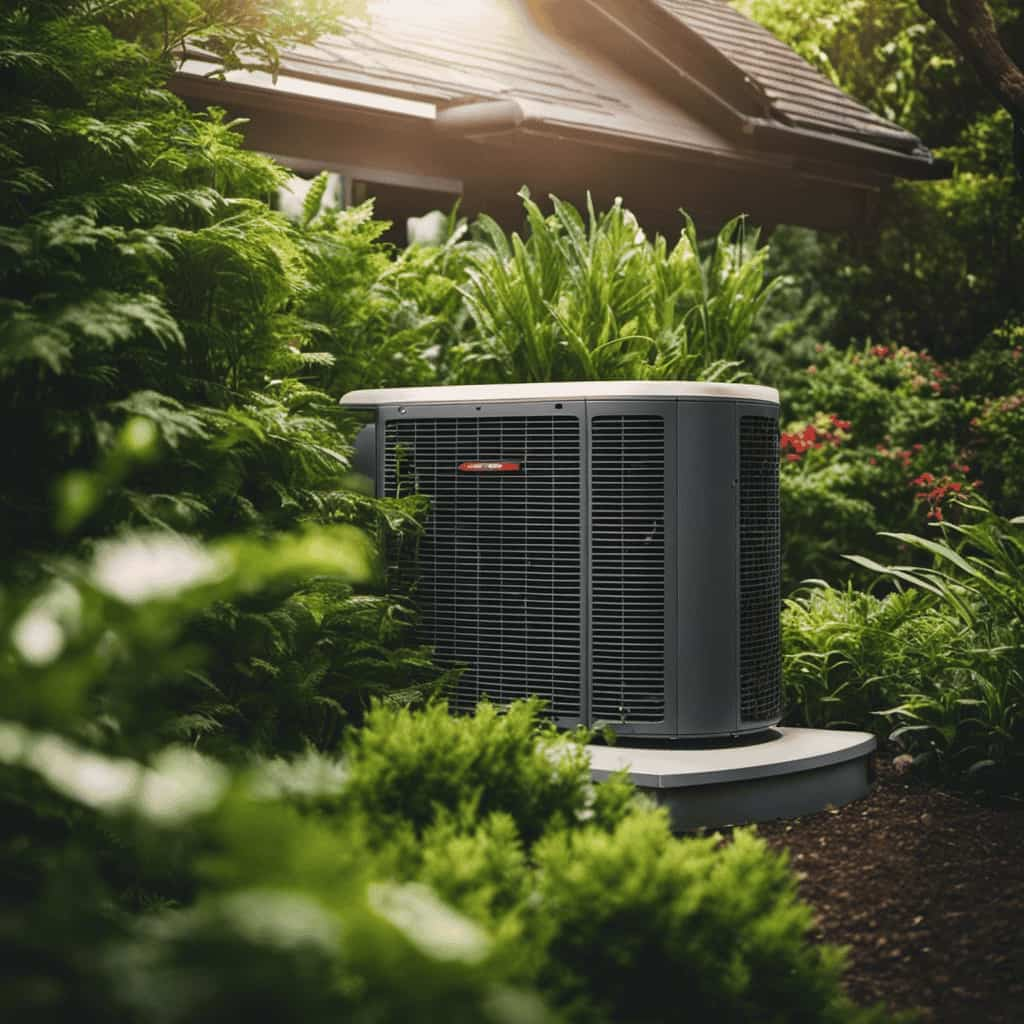
We believed we had a thorough understanding of sustainable home design, but our perspective changed when we learned about the impressive efficiency of heat pump systems.
In this article, we reveal the hidden benefits and secrets of these remarkable systems. From understanding energy efficiency ratings to tips for designing a sustainable home, we’ll guide you through the process of maximizing energy savings.
Prepare to be amazed by the innovations in heat pump technology that can transform your home into an eco-friendly haven.
Let’s dive into the world of heat pump systems and uncover their true potential.

Key Takeaways
- Heat pump systems significantly reduce energy consumption.
- Choosing a system with high SEER and HSPF ratings ensures maximum energy efficiency.
- Proper insulation and optimal system sizing are crucial for efficient heating and cooling.
- Regular maintenance helps maintain optimal system performance and energy efficiency.
The Benefits of Heat Pump Systems in Sustainable Home Design
One of the key benefits of heat pump systems in sustainable home design is that they can significantly reduce energy consumption. This advantage is especially important in today’s world, where energy efficiency is a top priority. By using heat pump systems, homeowners can lower their energy bills and reduce their carbon footprint.
Case studies have shown that these systems can achieve energy savings of up to 50% compared to traditional heating and cooling methods. Additionally, heat pump systems provide both heating and cooling capabilities, eliminating the need for separate systems and saving space.
They also offer precise temperature control and can be easily integrated with renewable energy sources such as solar panels. Overall, heat pump systems are a practical and efficient choice for sustainable home design.
Understanding Energy Efficiency Ratings for Heat Pump Systems
When it comes to understanding energy efficiency ratings for heat pump systems, we need to consider factors such as the Seasonal Energy Efficiency Ratio (SEER) and the Heating Seasonal Performance Factor (HSPF). These ratings are important in evaluating the performance of a heat pump system.

The SEER measures the cooling efficiency of the system during the cooling season, while the HSPF measures the heating efficiency during the heating season. Higher SEER and HSPF ratings indicate greater energy efficiency, which means lower energy consumption and cost savings.
It’s crucial to consider these ratings when choosing a heat pump system for your sustainable home. By opting for a system with high SEER and HSPF ratings, you can ensure maximum energy efficiency and reduce your environmental impact.
In the next section, we’ll discuss tips and considerations for designing a sustainable home with heat pump systems.
Designing a Sustainable Home With Heat Pump Systems: Tips and Considerations
To maximize the energy efficiency of our sustainable home, we should consider various tips and considerations when designing it with heat pump systems. Here are three key factors to keep in mind:

-
Proper insulation: Insulating your home effectively is crucial for reducing heat loss and ensuring that your heat pump system operates efficiently. Insulate walls, floors, and roofs to minimize heat transfer and maintain a comfortable indoor temperature.
-
Optimal system sizing: It’s important to choose the right size heat pump system for your home. Oversized systems can lead to inefficient operation, while undersized systems may struggle to meet your heating and cooling needs. Work with a professional to determine the appropriate size for your specific requirements.
-
Renewable energy integration: Consider integrating renewable energy sources, such as solar panels or wind turbines, with your heat pump system. This allows you to harness clean energy and further reduce your carbon footprint.
Maximizing Energy Savings Through Proper Heat Pump System Sizing
To maximize our energy savings, we need to ensure that our heat pump system is properly sized for our home. A heat pump that is too small will struggle to heat or cool our space efficiently, while a system that is too large will cycle on and off frequently, leading to increased energy consumption and wear and tear on the equipment. Proper heat pump sizing involves considering factors such as the size and layout of our home, insulation levels, and climate conditions. Consulting with a professional during the heat pump installation process is crucial to ensure accurate sizing. Additionally, regular heat pump maintenance, including cleaning filters and checking refrigerant levels, will help maintain optimal system performance and energy efficiency.
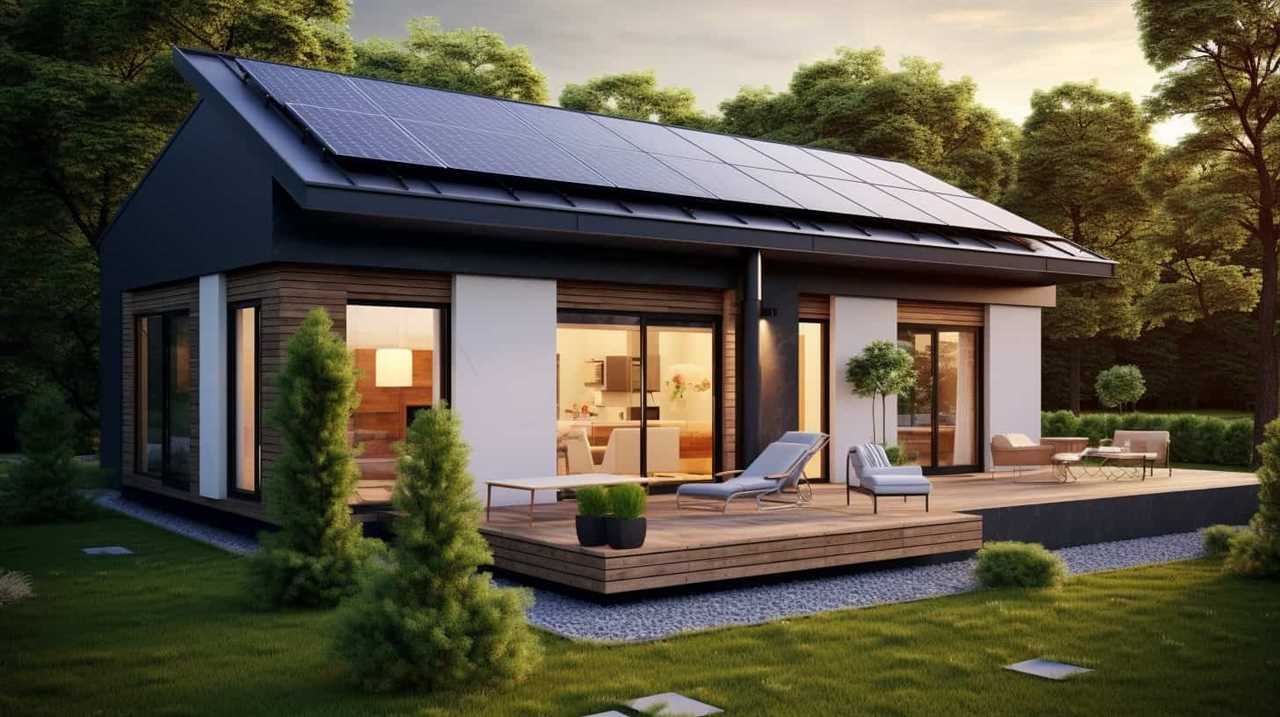
| Factors to Consider for Proper Heat Pump Sizing | |
|---|---|
| Size and layout of our home | Insulation levels |
| Climate conditions | |
| Consultation with a professional during installation | Regular heat pump maintenance |
Innovations in Heat Pump Technology for Sustainable Home Design
We have witnessed remarkable advancements in heat pump technology, revolutionizing sustainable home design. These innovations have brought about significant improvements in the efficiency and performance of heat pump systems, making them an increasingly attractive option for homeowners looking to integrate renewable energy sources into their homes.
Here are three key advancements in heat pump technology:
-
Variable speed compressors: These allow heat pumps to adjust their speed based on the heating or cooling needs of a home, resulting in more precise temperature control and increased energy efficiency.
-
Improved refrigerants: Newer heat pumps use environmentally friendly refrigerants that have a lower impact on the ozone layer and contribute less to global warming.

-
Smart controls and connectivity: Heat pumps now come equipped with smart thermostats and connectivity features, allowing homeowners to remotely control and monitor their systems, optimizing energy usage and reducing costs.
With these advancements, heat pump systems are now a reliable and efficient solution for sustainable home design, offering homeowners the opportunity to reduce their carbon footprint and save on energy bills.
Frequently Asked Questions
Are Heat Pump Systems Suitable for All Types of Homes, or Are There Specific Requirements?
Heat pump systems can be suitable for most homes, but specific requirements, such as adequate insulation and proper sizing, should be met. Consider heat pump system installation costs and the environmental impact when deciding on sustainability.
How Long Do Heat Pump Systems Typically Last Before Needing to Be Replaced?
Heat pump systems typically last around 15-20 years before needing replacement. Factors that affect their lifespan include proper maintenance, usage patterns, and the quality of the system’s components.
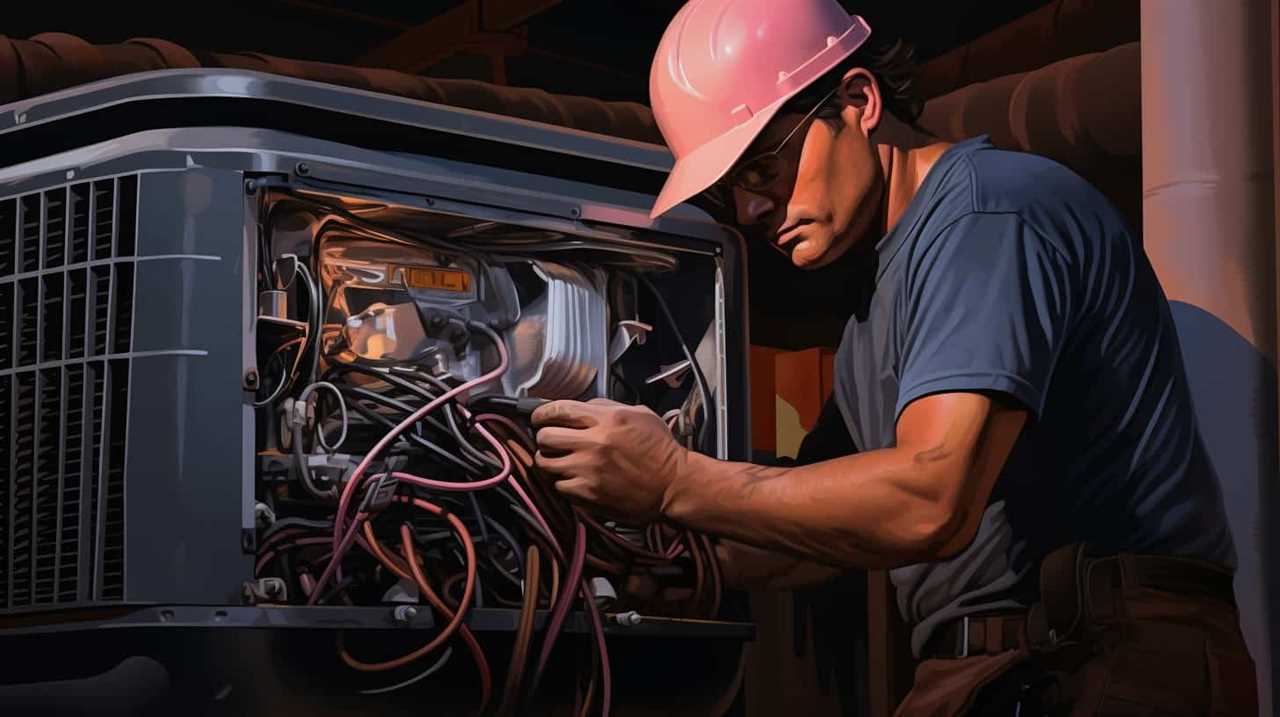
Can Heat Pump Systems Be Used for Both Heating and Cooling Purposes?
Yes, heat pump systems can be used for both heating and cooling purposes. They offer efficient temperature control in our homes. The benefits of using these systems include energy savings and a comfortable living environment.
Are There Any Government Incentives or Rebates Available for Homeowners Who Choose to Install Heat Pump Systems?
Government incentives and rebates are available for homeowners who install heat pump systems. These incentives are designed to encourage energy savings and make sustainable home design more accessible and affordable for everyone.
Are There Any Maintenance Requirements or Costs Associated With Heat Pump Systems?
Maintaining heat pump systems requires regular maintenance to ensure optimal performance. Costs associated with maintenance include filter replacements, annual inspections, and occasional repairs. However, these costs are outweighed by the long-term energy savings and environmental benefits.
Conclusion
In conclusion, heat pump systems are a symbol of efficiency and sustainability in home design.

Their energy efficiency ratings and innovative technology make them a practical choice for those seeking to reduce their environmental impact.
By properly sizing the system and considering tips for sustainable design, homeowners can maximize energy savings and create a comfortable living space.
So, let’s embrace the power of heat pump systems and build a greener future for our homes.
-

 Residential and Commercial Applications3 months ago
Residential and Commercial Applications3 months agoBest Amana Heat Pump Reviews
-

 Thermal Energy Transfer3 months ago
Thermal Energy Transfer3 months agoBreakthroughs in Modern Heat Pump Systems: Thermal Energy Edition
-

 Residential and Commercial Applications3 months ago
Residential and Commercial Applications3 months agoBest Heat Pump
-

 Geothermal Heat Pumps2 months ago
Geothermal Heat Pumps2 months agoUpgrade Your Comfort with Our Efficient HVAC Systems
-

 Geothermal Heat Pumps2 months ago
Geothermal Heat Pumps2 months agoInnovative Geothermal Heat Pump Manufacturers Revolutionize Energy Efficiency
-

 Air Conditioning4 weeks ago
Air Conditioning4 weeks agoExploring Energy-Efficient Air Conditioning Heat Pumps
-

 Thermal Energy Transfer3 months ago
Thermal Energy Transfer3 months agoBoost Your Heat Pump Efficiency: Interactive Guide
-

 Residential and Commercial Applications3 months ago
Residential and Commercial Applications3 months agoBest Portable Heat Pump Heat & AC










